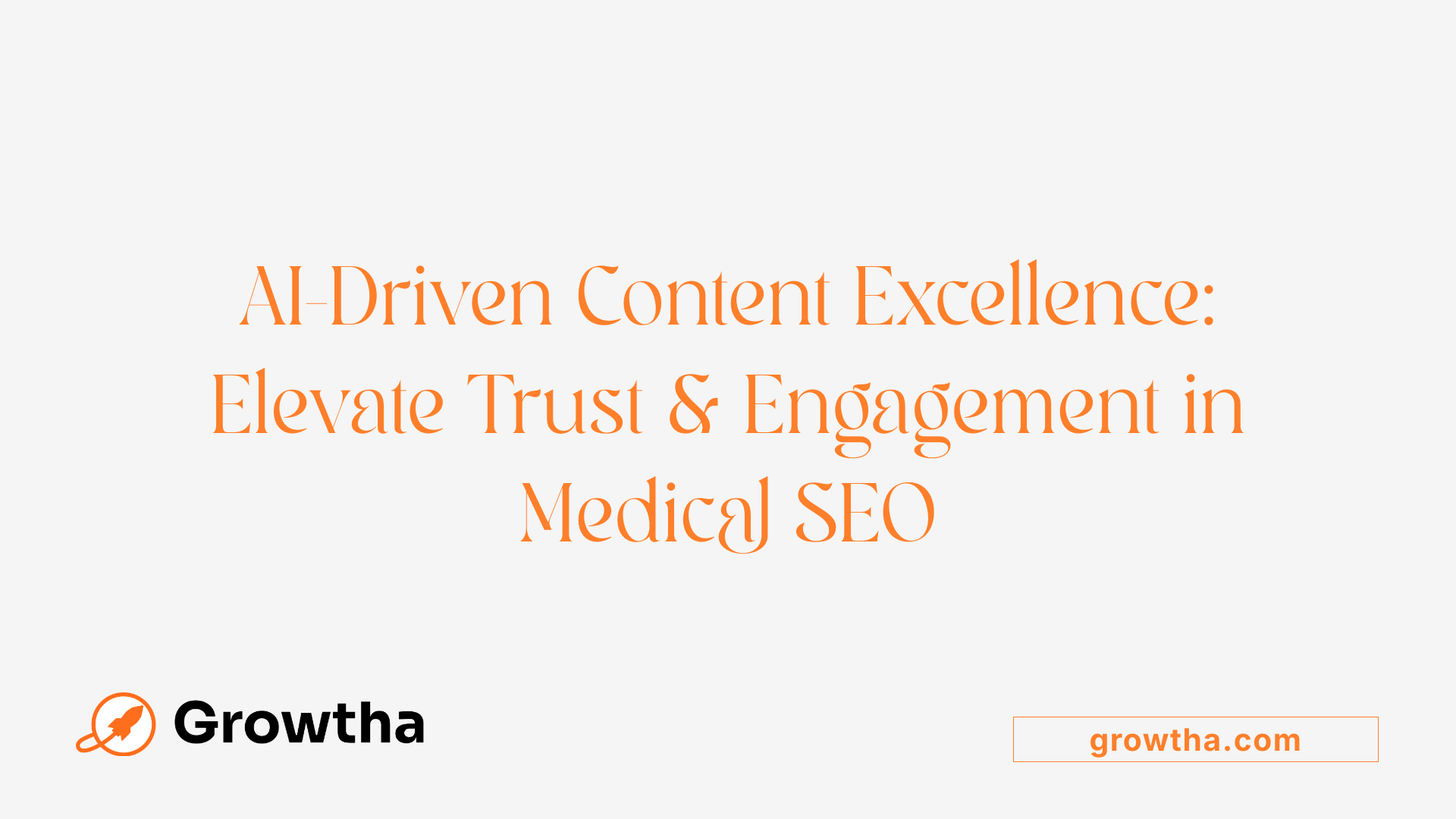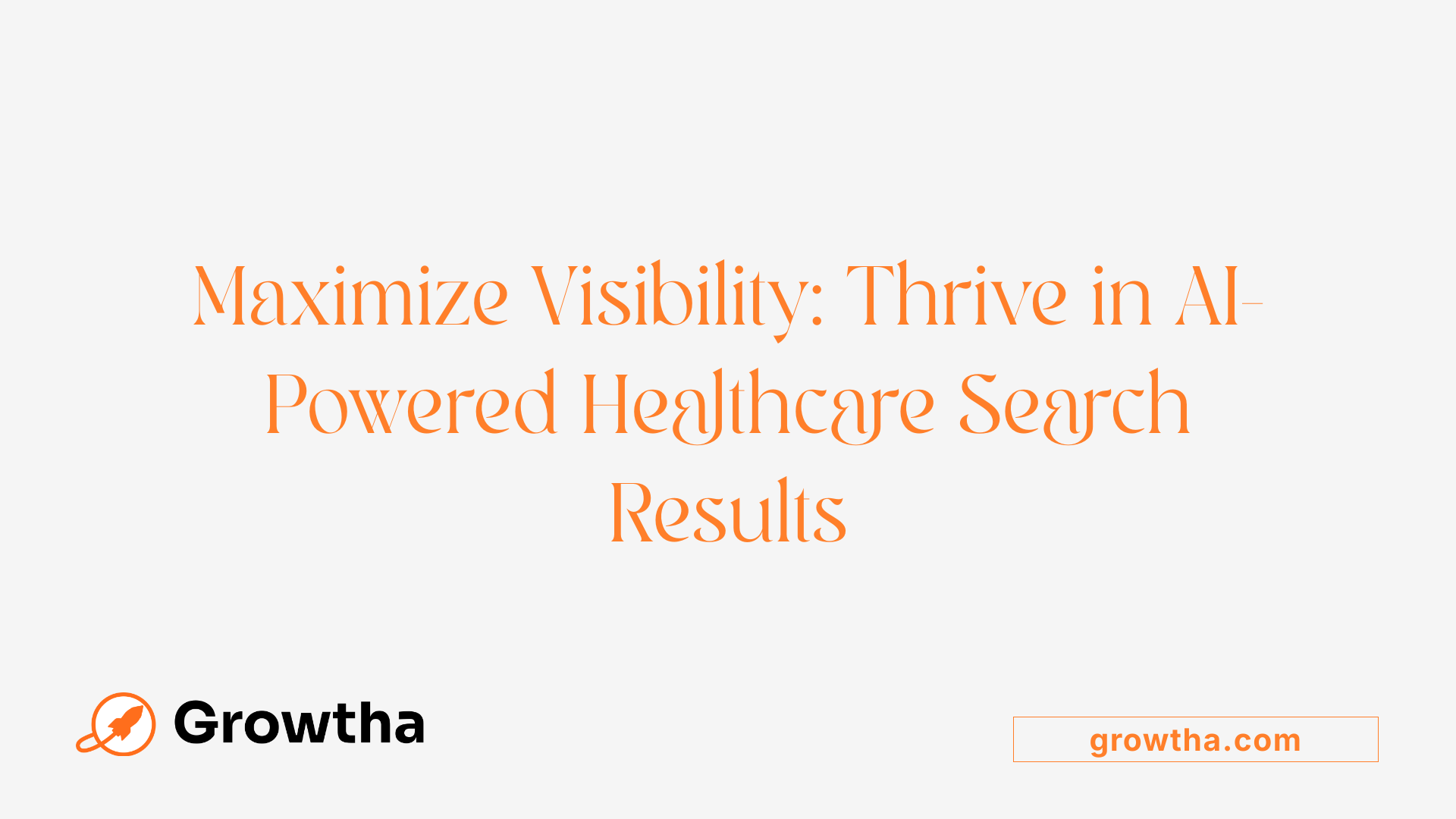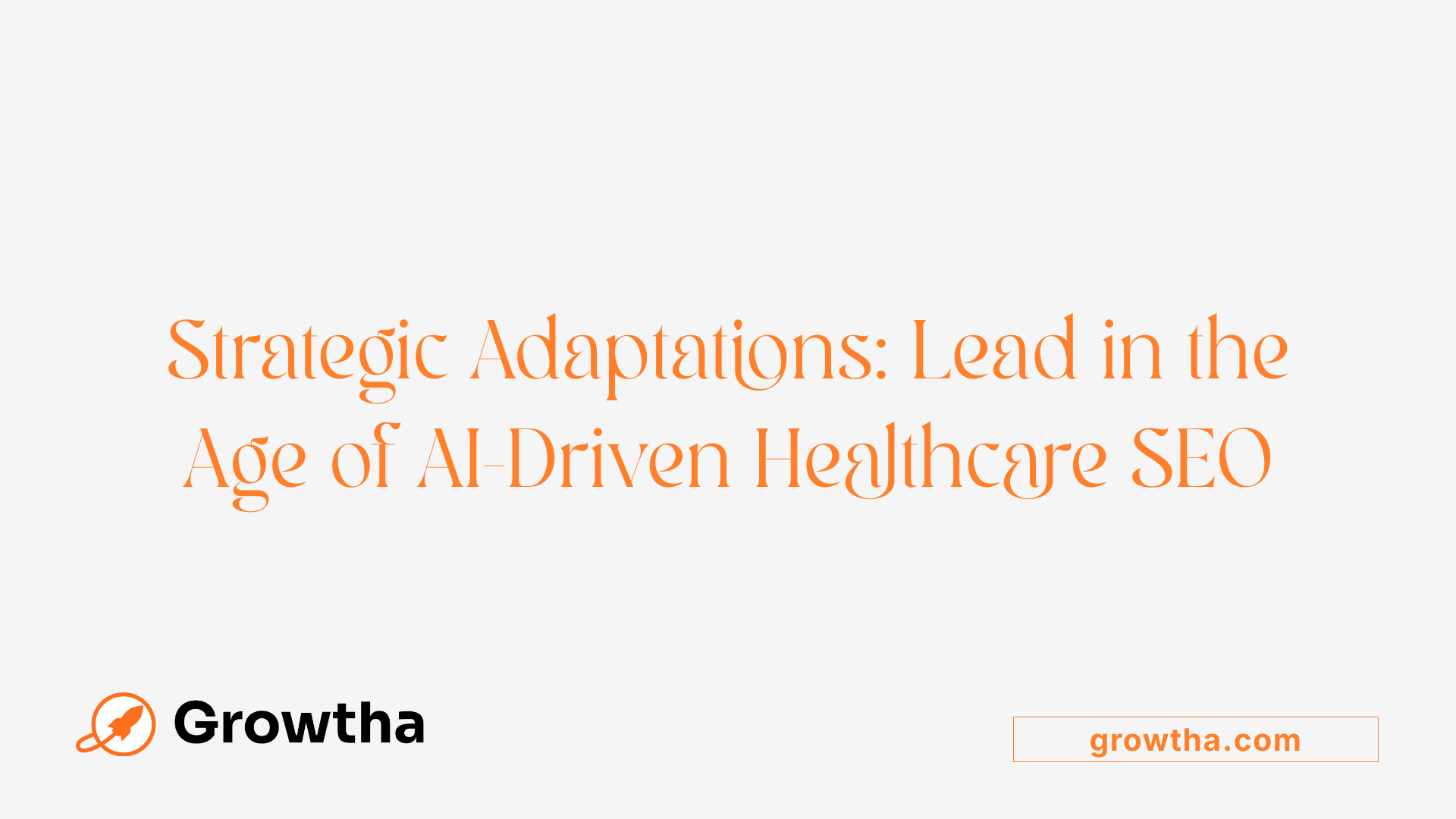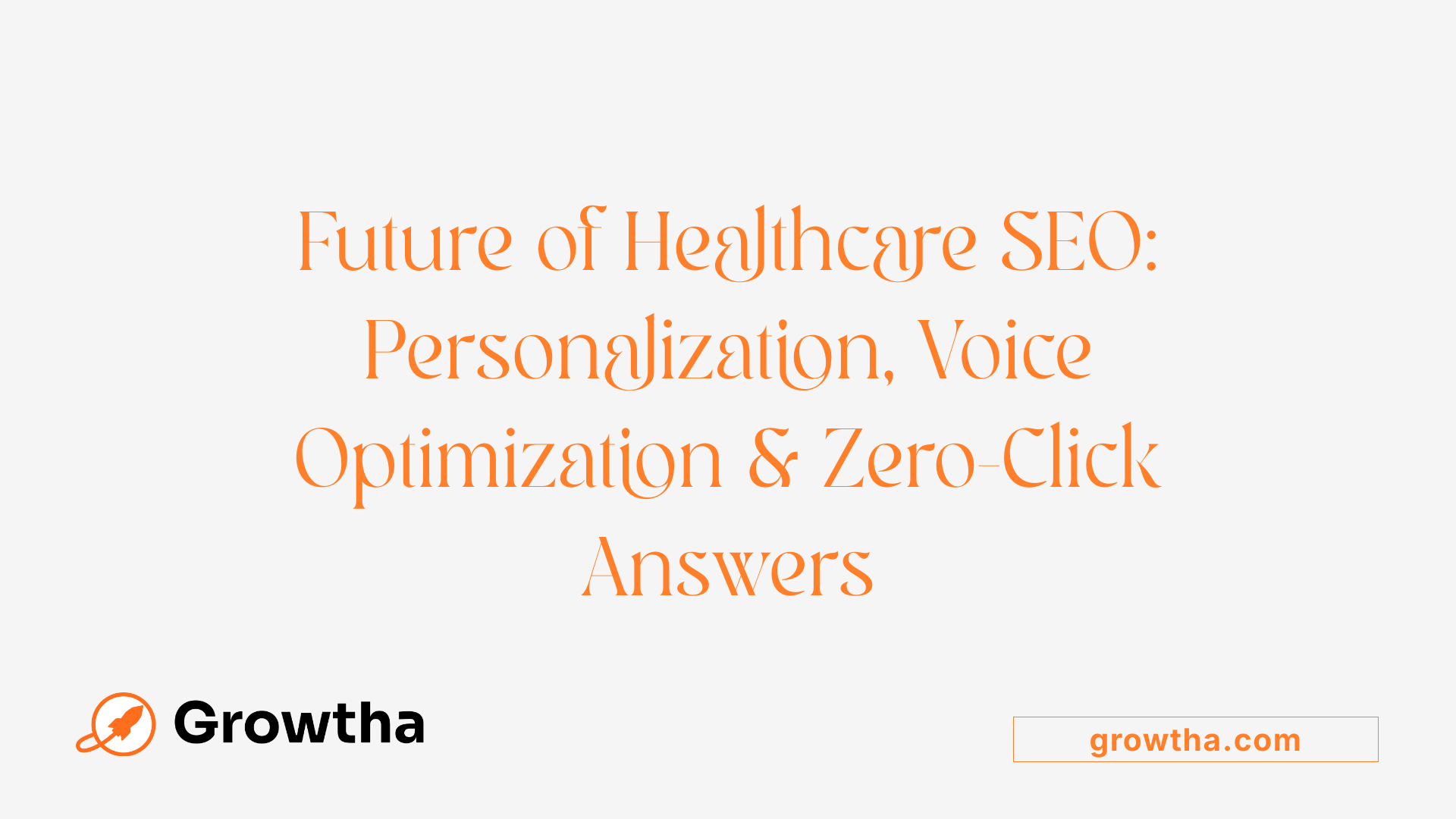How AI Is Changing Medical SEO
Revolutionizing Healthcare Visibility in the Age of AI


How AI Is Changing Medical SEO
Transforming Medical Search with Artificial Intelligence
The rapid integration of AI technologies is fundamentally transforming medical SEO, reshaping how healthcare providers optimize their online presence. As AI-driven tools and search features become more sophisticated, medical practices and health systems must adapt to maintain visibility and authority. This article explores how AI influences medical SEO practices, the advantages and challenges it presents, and strategic steps healthcare professionals can take to thrive in this evolving landscape.
AI's Role in Content Creation and Optimization in Medical SEO

How is AI supporting content creation in medical SEO?
AI plays a vital role in streamlining content creation for healthcare organizations by automating several key tasks. It helps in outlining and organizing content ideas, making the creation process more efficient. Repackaging existing materials allows for refreshing old content into new formats, increasing its relevance and engagement.
AI also excels at editing, ensuring content is clear, accurate, and aligned with SEO best practices. This includes optimizing keywords, enhancing readability, and maintaining a consistent tone—crucial elements for medical professionals aiming for high-quality, trustworthy content.
Moreover, AI generates formulaic yet essential SEO components such as meta descriptions, provider bios, and page headlines. These elements are crafted to be both appealing and optimized for search engine algorithms, enhancing the chances of higher rankings and better visibility.
Beyond text, AI tools assist in visual content ideation by suggesting image and video ideas relevant to healthcare topics, which improve user engagement. They also analyze large datasets to identify patterns in patient queries, trending health topics, and common questions. This data-driven insight allows healthcare providers to tailor their content to address audience needs more precisely, ultimately improving their online presence and authority.
In summary, AI supports healthcare SEO by automating content workflows, enhancing content quality, and providing actionable insights to stay ahead in a competitive digital landscape. Its role is to augment human expertise rather than replace it, ensuring the delivery of credible, engaging, and well-optimized healthcare content.
Harnessing AI for Data-Driven Insights and Visual Content
How does AI enable healthcare organizations to analyze data?
AI plays a crucial role in helping healthcare organizations sift through large volumes of data efficiently. Through advanced algorithms, machine learning models, and natural language processing, AI identifies patterns, trends, and correlations that might be invisible to human analysts. This capability enables providers to gain deeper insights into patient behaviors, treatment outcomes, and service utilization.
By analyzing data such as patient records, online searches, social media interactions, and review feedback, AI can surface actionable intelligence. This empowers healthcare marketers and administrators to craft more targeted content, personalize outreach efforts, and make strategic decisions based on real-time data insights.
Moreover, AI's capacity to process complex datasets enhances the creation of visual content. Visuals like infographics, charts, or interactive dashboards can be tailored to reflect the most relevant and engaging trends, increasing the likelihood of reaching and resonating with the intended audience.
When used effectively, AI-driven data analysis not only amplifies content relevance but also optimizes overall marketing strategies. It ensures healthcare providers produce visually compelling, data-backed content that aligns with patient interests and searches, ultimately boosting engagement and trust.
AI and Content Integrity: Balancing Automation with Authenticity
How does AI impact content originality and trustworthiness?
AI technology can efficiently generate various types of content, including repetitive and formulaic pieces like meta descriptions, provider bios, and page headlines. While this automation improves efficiency, it raises important questions about maintaining originality and trustworthiness.
High-quality AI content should always be customized to meet the specific needs and interests of the target healthcare audience. It should reflect a genuine understanding of the subject matter, providing accurate, relevant, and helpful information. When AI-generated content is tailored and reviewed by human experts, it upholds the standards of authenticity and authority that users expect.
Search engines like Google strongly favor content that is genuinely human-made. They prioritize websites showcasing authentic, expert, and trustworthy information—especially in healthcare, where accuracy and credibility are critical. If AI outputs become too generic or spam-like, they can damage a provider’s credibility and even harm SEO rankings.
Therefore, healthcare organizations should use AI as a support tool for creating content but must ensure that content remains original, authoritative, and aligned with their expertise. Regular human oversight and editing are necessary steps to preserve the quality, integrity, and reputation of healthcare content.
For those interested in deeper insights, a useful search query is "Ensuring authenticity in AI-generated healthcare content," which offers guidance on best practices to combine technological efficiency with human authenticity.
In summary, while AI can streamline content creation, healthcare providers must balance automation with manual input to maintain audience trust, uphold legal standards like HIPAA, and ensure their content remains clear, trustworthy, and valuable.
The Impact of AI-Driven Search Technologies on Healthcare Content Visibility

How do AI Overviews influence healthcare search results?
AI Overviews play a pivotal role in shaping how healthcare information appears in search results. These AI-generated summaries are displayed at the very top of Google search pages, providing users with quick, authoritative, and comprehensive answers. They focus on trusted sources such as Mayo Clinic, WebMD, and major health systems, citing relevant data to build credibility.
For healthcare providers and content creators, this means that having well-structured, high-quality content aligned with Google's E-E-A-T (Experience, Expertise, Authoritativeness, Trustworthiness) guidelines is more crucial than ever. Content optimized for AI Overviews often includes clear headings, FAQs, and structured data like schema markup, enabling AI to understand and accurately summarize the information.
This new emphasis shifts the traditional focus from ranking solely based on links and keywords to becoming a preferred source cited in AI summaries. Therefore, investing in authoritative, in-depth content that answer common patient questions effectively increases the chances of being featured in these AI Overviews, ultimately boosting visibility and trust.
Search generative experience changes traditional rankings
The Search Generative Experience (SGE) introduces a more conversational, snippet-driven approach to search results. Instead of static list-based links, AI-powered responses synthesize information from multiple sources, prioritizing relevance and authority. This transformation means that many users will find their answers without needing to click through multiple websites.
For healthcare SEO, this necessitates a shift in strategy: content must directly answer user questions, be easily digestible, and cite reputable sources. Creating content with question-based headers, clear summaries, and structured data helps AI models retrieve and summarize relevant information effectively. Consequently, visibility depends more on being a trusted, well-optimized source rather than merely ranking on keywords.
AI Mode shifts how healthcare content is displayed
The latest AI modes like Google’s AI Mode personalize search results further, emphasizing direct answers through summaries and recommendations. This mode favors content that is structured to align with the AI’s understanding, such as including FAQs and relevant schema markup.
In this environment, healthcare content should prioritize answerability, clarity, and evidence-backed information. Active reputation management, including positive reviews and authoritative backlinks, supports the AI in citing healthcare providers confidently.
Overall, AI-driven search technologies are revolutionizing healthcare content visibility by rewarding authoritative, well-structured, and comprehensive content. Practitioners and marketers must adapt by focusing on quality, schema markup, and audience trust to succeed in this emerging landscape.
Adapting Content Strategies for AI-Driven Search Environment

What strategies should healthcare professionals adopt for AI-driven SEO?
Healthcare professionals must evolve their SEO tactics to remain prominent in an AI-dominated search landscape. First, they should develop comprehensive, authoritative content that directly addresses common patient questions. This involves creating detailed articles, FAQs, and guides enriched with structured data, such as schema markup, which helps AI systems understand and rank content effectively.
In addition, optimizing for answerability is vital. Content should be organized with clear headings, bullet points, and concise summaries, making it easy for AI and users to find specific information quickly. Local SEO also plays a crucial role, as a significant share of health-related searches contains local intent. Maintaining accurate Google Business Profiles, encouraging positive reviews, and utilizing local keywords can help healthcare practices appear prominently for nearby patients.
Consistently updating website content to reflect the latest medical information and guidelines boosts credibility and relevance. This ongoing effort enhances trustworthiness in both AI responses and patient perceptions. Combining these strategies ensures healthcare providers remain visible and authoritative across evolving AI search environments.
Emerging Trends: Personalized Search, Voice Search, and Zero-Click Impact

How is healthcare SEO evolving with AI?
The landscape of healthcare SEO is dramatically shifting due to the rapid advancements in AI technology. Future trends are increasingly centered around delivering personalized search experiences that cater to individual patient needs and preferences.
One major trend is the growth of voice-first queries. Patients are now using natural language, conversational questions to find healthcare information, often via smart devices and virtual assistants. To optimize for this, healthcare providers should develop content that answers common questions clearly and conversationally, using FAQ schema markup and long-tail keywords.
Complementing voice search is the rise of visual health search inquiries. Patients increasingly look for image-based information, such as symptom visuals or treatment illustrations. This calls for integrating high-quality images, infographics, and videos optimized for visual search engines.
A significant development impacting healthcare SEO is the increase in zero-click searches. These are search results where users get their answers directly from AI summaries, knowledge panels, or rich snippets without visiting actual websites. While this reduces website traffic, it also highlights the importance of appearing in AI Overviews and rich snippets through authoritative, structured, and answer-oriented content.
How do these trends influence future healthcare SEO strategies?
Future healthcare SEO will increasingly focus on creating personalized, authoritative, and structured content tailored to AI's understanding and citation needs. Optimizing for voice and visual search involves altering content formats and employing schema markup for better comprehension.
Given the growth of zero-click searches, healthcare organizations should aim to be featured in Google AI summaries by producing high-quality, comprehensive answers for common patient questions. Claiming and maintaining active Google Business Profiles, gathering positive reviews, and utilizing structured data are crucial steps.
What predictions can be made for healthcare SEO in the coming years?
In the future, AI algorithms will offer even more personalized search results based on detailed health data and user contexts. The integration of AI-driven recommendation engines will guide patients directly to relevant services or content.
Overall, the focus will be on authoritative, trustworthy, and highly structured content that satisfies AI's criteria for citation and answer generation. Adapting SEO strategies to these trends can help healthcare practices improve visibility, trust, and patient engagement.
For more insights into these trends, search queries like "Future AI trends in healthcare SEO" can provide detailed forecasts and strategies.
Technical and Reputational Aspects of AI-Optimized Healthcare Content
How do healthcare providers ensure their content remains authoritative and trustworthy in AI search?
To maintain credibility in AI search results, healthcare providers must focus on implementing schema markup and structured data. These tools help AI systems understand the content's context, ensuring that the information is accurately represented and ranked appropriately.
Managing online reputation is equally critical. By actively monitoring reviews and conducting sentiment analysis, providers can enhance their trustworthiness. Positive feedback and a reputable online presence signal authority to AI models.
Furthermore, ensuring HIPAA compliance is essential when utilizing AI tools. This involves anonymizing patient data, following strict privacy protocols, and avoiding the use of personally identifiable information without consent.
Together, these strategies—structured data implementation, reputation management, and privacy adherence—help healthcare organizations improve their visibility, establish authority, and foster trust in an AI-driven search environment. Maintaining high standards of accuracy and credibility will support their content in ranking well and being cited by AI summaries.
Navigating the Future of Medical SEO with AI
AI continues to revolutionize medical SEO by improving content relevance, enhancing local visibility, and shifting search behaviors towards personalized, voice, and zero-click answers. Healthcare providers need to adapt by prioritizing authoritative, structured, and audience-specific content while leveraging AI tools for ongoing insights and optimization. Staying ahead requires a balanced approach that combines human expertise with AI efficiencies, ensuring trust, accuracy, and accessibility in healthcare communications. Embracing these changes will not only improve search rankings but also strengthen patient engagement and trust in an increasingly AI-integrated digital healthcare ecosystem.
References
- Managing Healthcare SEO in the Age of AI - Geonetric
- How AI Search Is Changing Healthcare Marketing NOW - PracticeBeat
- What is google medical SEO with AI mode? - PatientGain
- How Local SEO And AI Tools Like ChatGPT Are ... - Forbes
- How AI search ranks healthcare content: A ChatGPT vs. Google ...
- The Future of Search in Healthcare Marketing - Aha Media Group
- AI Overviews and Healthcare SEO: What Marketers Need to Know







